7年级下册英语2模块复习资料外研版
外研版七年级英语下册 Module 2模块知识点归纳
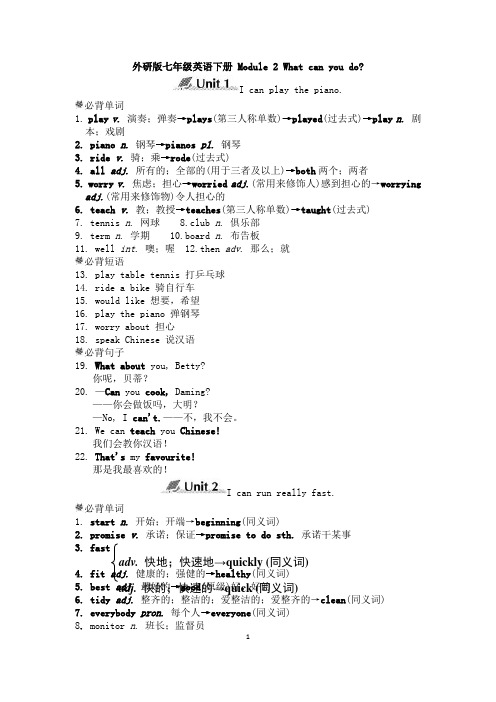
外研版七年级英语下册 Module 2 What can you do? I can play the piano.必背单词1. play v. 演奏;弹奏→plays (第三人称单数)→played (过去式)→play n. 剧本;戏剧2. piano n. 钢琴→pianos pl. 钢琴3. ride v. 骑;乘→rode (过去式)4. all adj. 所有的;全部的(用于三者及以上)→both 两个;两者5. worry v. 焦虑;担心→worried adj.(常用来修饰人)感到担心的→worrying adj.(常用来修饰物)令人担心的6. teach v. 教;教授→teaches (第三人称单数)→taught (过去式)7. tennis n . 网球 8.club n . 俱乐部9. term n . 学期 10.board n . 布告板11. well int . 噢;喔 12.then adv . 那么;就必背短语13. play table tennis 打乒乓球14. ride a bike 骑自行车15. would like 想要,希望16. play the piano 弹钢琴17. worry about 担心18. speak Chinese 说汉语必背句子19. What about you, Betty?你呢,贝蒂?20. —Can you cook, Daming?——你会做饭吗,大明?—No, I can't.——不,我不会。
21. We can teach you Chinese!我们会教你汉语!22. That's my favourite!那是我最喜欢的! I can run really fast.必背单词1. start n. 开始;开端→beginning (同义词)2. promise v. 承诺;保证→promise to do sth. 承诺干某事3. fast4. fit adj. 健康的;强健的→healthy (同义词)5. best adj. 最好的→good (原级)好,好的6. tidy adj. 整齐的;整洁的;爱整洁的;爱整齐的→clean (同义词)7. everybody pron. 每个人→everyone (同义词)8. monitor n . 班长;监督员adv. 快地;快速地→quickly (同义词) adj. 快的;快速的→quick (同义词)9. ready adj. 乐意的10. just adv. 就;正好11. ball n. 球;球类游戏12. game n. 运动项目13. team n. 队伍;球队14. score n. 得分;成绩15. sure adj. 确信的;有把握的16. beautiful adj. 美的;美丽的必背短语17. get on well with sb. 与某人相处融洽18. ready to do sth. 乐于做某事19. work hard 努力工作20. be good at sth. 擅长某事21. do cleaning 打扫卫生22. just like 正如,正像必背句子23. It's the start of the new term and we're choosing our new monitors.这是新学期的开始,我们正在选我们的新班长。
期中复习-外研版七年级下册Module 2重点内容复习总结
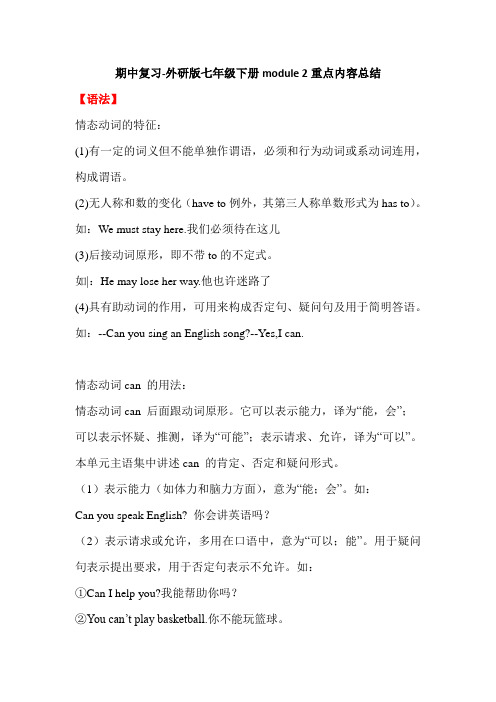
期中复习-外研版七年级下册module 2重点内容总结【语法】情态动词的特征:(1)有一定的词义但不能单独作谓语,必须和行为动词或系动词连用,构成谓语。
(2)无人称和数的变化(have to例外,其第三人称单数形式为has to)。
如:We must stay here.我们必须待在这儿(3)后接动词原形,即不带to的不定式。
如|:He may lose her way.他也许迷路了(4)具有助动词的作用,可用来构成否定句、疑问句及用于简明答语。
如:--Can you sing an English song?--Yes,I can.情态动词can 的用法:情态动词can 后面跟动词原形。
它可以表示能力,译为“能,会”;可以表示怀疑、推测,译为“可能”;表示请求、允许,译为“可以”。
本单元主语集中讲述can 的肯定、否定和疑问形式。
(1)表示能力(如体力和脑力方面),意为“能;会”。
如:Can you speak English? 你会讲英语吗?(2)表示请求或允许,多用在口语中,意为“可以;能”。
用于疑问句表示提出要求,用于否定句表示不允许。
如:①Can I help you?我能帮助你吗?②You can’t play basketball.你不能玩篮球。
(3)表示可能。
如:①He can be at home now.他现在可能在家。
②The moon can’t always be full.月亮不可能常圆。
含有情态动词can 的肯定句变否定句时,直接在它后面加not;肯定句变一般疑问句时,把can提前即可。
见下表:如:My sister can sing.My sister can’t sing.--Can your sister sing?--Yes ,she can.--No ,she can’t.【重点词汇】worry about担心worry about=be worried about担心。
外研版七年级英语下册模块2知识点归纳

外研社七年级英语下册模块2 What can you do知识点归纳知识点一:模块2的短语1.would like to do sth . 想要做某事2.join a club参加俱乐部3.play the piano弹钢琴4.worry about 担心,担忧5.teach sb. sth. 教某人某事6.get on well with ... 与……相处融洽7.be ready to do sth . 乐于做某事8.promise sb. sth.承诺/保证某人某事9.be good at擅长做某事10.do cleaning 打扫卫生知识点二:重点词语解释Unit one1.would like to do sth . 想要做某事eg:I would like to go there with you.我想跟你一起去那里。
would like常缩写为’d like。
would没有人称和数的变化。
其用法如下:eg:Mike would like some bananas. 迈克想要一些香蕉。
We’d like to watch TV. 我们想看电视。
I’d like Lingling to go with me. 我想让玲玲跟我去。
2.join v.参加,加入到……之中eg:Would you like to join the Football Club, Kate? 凯特,你想加入足球俱乐部吗?join 指加入某党派、某组织或某社会团体或某一人群中,成为其中的一员。
Will you join us for dinner?你和我们一起吃饭好吗?take part in 指参加群众性活动、劳动、游行等,有时可与join in互换。
Will you take part in the English evening? 你会参加英语晚会吗?3.play the piano弹钢琴当play后面跟某种乐器名词时,表示乐器的名词前要加the;当play后面跟球类或棋类名词时,其前不加任何冠词。
【早读必备】七年级英语外研版下册Module2_重点单词短语句子

Module 2 What can I do?一、必背词汇play[pleɪ] v. 演奏,弹奏tennis ['tenɪs]n. 网球piano [pɪ'ænəʊ] n.钢琴ride [raɪd] v. ( rode ) 骑,乘club[klʌb] n. 社团term[tɜːm]n. 学期board[bɔːd]n. 布告板all [ɔːl]adj. 所有的,全部的worry ['wʌrɪ] v. 焦虑,担心teach[tiːtʃ] v. ( taught ) 教,讲then [ðen] adv. 那么,就monitor ['mɒnɪtə] n. 班长,监督员start [stɑːt]n.开始,开端ready ['redɪ] adj.乐意的promise ['prɒmɪs] v. 承诺,保证fast [fɑːst] adv. 快地,快速地adj. 快的,快速的fit [fɪt] adj. 健康的,强健的just [dʒʌst]adv. 就,正好ball [bɔːl]n. 球,球类游戏game[geɪm]n. 运动项目team[tiːm]n. 队伍,球队best[best] adj. 最好的score [skɔː] n. 得分,成绩tidy ['taɪdɪ]adj. 整齐的,整洁的,爱整洁的v. 收拾,整理sure [ʃɔː] adj. 确信的,有把握的everybody['evrɪbɒdɪ] pron. 每个人beautiful['bjuːtɪfʊl] adj. 美的,美丽的fly [flaɪ] v. ( flew ) 放飞(风筝);飞行;乘飞机kite[kaɪt] n. 风筝swim[swɪm]v. ( swam ) 游泳二、必背短语1. play the piano弹钢琴2. play tennis打网球3. play table tennis打乒乓球4. ride a bike骑自行车5. worry about担心……6. get on well with sb.与……友好相处7. ready to do sth.准备好作某事8. promise to do sth.承诺做某事9. do some cleaning打扫10. fly a kite放风筝三、经典句型1. I’d like to join the Music Club because I can play the piano.我想加入音乐社团,因为我会弹钢琴。
外研版七年级英语英语(下册)知识点归纳

外研版七年级英语英语(下册)知识点归纳路漫漫其修远兮,吾将上下而求索。
第一模块:本模块主要介绍了一些常用短语和句型结构。
其中包括“失物招领箱”、“小心保管”、“从现在开始”、“首先”、“寻找”、“找到”、“努力做某事”、“从…中挑选”、“例如”等。
此外,还介绍了一些常用的语法专项,如物主代词的单数和复数形式等。
第二模块:本模块主要介绍了一些与爱好和运动相关的短语和句型结构。
其中包括“与某人相处融洽”、“弹钢琴”、“打乒乓球”、“担心”、“擅长做某事”、“放风筝”等。
此外,还介绍了一些常用的句型结构,如“做…怎么样”、“愿意做某事”、“承诺做某事”等。
改写建议:第一模块:这一模块介绍了一些常用的短语和句型结构,例如失物招领箱、小心保管、从现在开始、首先、寻找、找到、努力做某事、从…中挑选、例如等。
此外,还介绍了一些常用的语法专项,比如物主代词的单数和复数形式等。
第二模块:这一模块介绍了一些与爱好和运动相关的短语和句型结构,例如与某人相处融洽、弹钢琴、打乒乓球、担心、擅长做某事、放风筝等。
此外,还介绍了一些常用的句型结构,比如做…怎么样、愿意做某事、承诺做某事等。
The journey is long and arduous。
but I will XXX。
In terms of grammar。
it is XXX of using "your"。
"his"。
"her"。
or "its"。
it is best to use specific names or XXX。
Moving on to Module 3.some useful phrases include "have a ic"。
"check one's email"。
and "go over"。
外研版七年级下册英语Module2Whatcanyoudo知识点及练习(有答案)
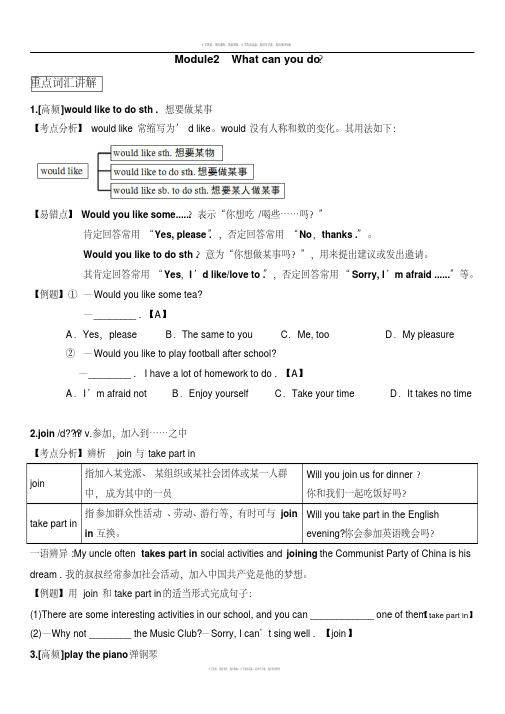
Module2 What can you do?重点词汇讲解1.[高频]would like to do sth .想要做某事【考点分析】would like常缩写为’d like。
would没有人称和数的变化。
其用法如下:【易错点】Would you like some......?表示“你想吃/喝些……吗?”肯定回答常用“Yes, please .”,否定回答常用“No,thanks .”。
Would you like to do sth .?意为“你想做某事吗?”,用来提出建议或发出邀请。
其肯定回答常用“Yes,I’d like/love to .”,否定回答常用“Sorry, I’m afraid ......”等。
【例题】①—Would you like some tea?—________ . 【A】A.Yes,please B.The same to you C.Me, too D.My pleasure②—Would you like to play football after school?—________ . I have a lot of homework to do . 【A】A.I’m afraid not B.Enjoy yourself C.Take your time D.It takes no time2.join /d???n/ v.参加,加入到……之中【考点分析】辨析join与take part injoin 指加入某党派、某组织或某社会团体或某一人群中,成为其中的一员Will you join us for dinner?你和我们一起吃饭好吗?take part in 指参加群众性活动、劳动、游行等,有时可与joinin互换。
Will you take part in the Englishevening?你会参加英语晚会吗?一语辨异:My uncle often takes part in social activities and joining the Communist Party of China is his dream . 我的叔叔经常参加社会活动,加入中国共产党是他的梦想。
外研版七年级英语下册期末复习资料(全)

外研版七年级英语下册期末复习资料(全)本篇文章没有明显的格式错误,但是可以进行小幅度的改写,使其更加流畅和易读。
第一模块:短语归纳:1.失物招领箱2.小心…3.从现在开始4.匆忙5.成百上千6.寻找(过程)7.首先8.找到(结果)9.努力做某事(会成功)10.从…中挑选11.试图做某事(成功与否未知)12.此时此刻13.例如(用于列举)14.例如重点句型结构:1.这是谁的…?2.帮助某人做某事3.请小心保管…4.欢迎来到…5.拨…给某人打电话语法专项:物主代词:表示所属关系的代词(…属于谁的)单数人称第一人称第二人称第三人称复数名词性物主代词oursyoursTheirs形容词性物主代词myyourhisheritsmineyourshishersitsouryourtheir形容词性物主代词和名词性物主代词的关系:形容词性物主代词:必须和名词在一起。
例如:My father。
your teacher。
名词性物主代词:相当于与之相对应的形容词性物主代词+名词。
例如:This shirt is mine。
= This is my shirt.第二模块:短语归纳:1.与某人相处融洽2.弹钢琴3.打乒乓球4.怎么样?5.担心…6.擅长做某事7.放风筝8.仅此而已9.乐于做某事重点句型结构:无本篇文章没有明显的格式错误,但是可以进行小幅度的改写,使其更加流畅和易读。
例如,在第一模块中,可以将短语归纳和重点句型结构分开,以便更好地区分它们。
同时,可以将语法专项部分的表格改为更易读的列表形式。
在第二模块中,可以简化短语归纳部分的表述,使其更加简洁明了。
一.短语归纳。
1.take a taxi乘出租车2.go shopping去购物3.have a party举办聚会4.visit a museum参观博物馆5.go to the cinema去电影院6.have a barbecue烧烤7.go to the beach去海滩8.go for a swim去游泳9.go hiking去徒步旅行10.go fishing去钓鱼11.go camping去露营12.have a ic去野餐二.重点句型结构。
七年级下册外研版英语module2知识点

七年级下册外研版英语module2知识点Module 2:My Favourite Subject本章知识点主要涉及以下内容:学科名称的表达、对学科的质疑和回应、时间表达和日常活动描述等。
一、学科名称的表达本章主要学科涉及语文、数学、英语、物理、化学、生物、历史、地理等。
1. 语文语文的英文表达为 Chinese,我们也可以使用中文的拼音Chinesexue进行表达。
例如:I like Chinese. 我喜欢语文。
2. 数学数学的英文表达为 Mathematics 或 Maths。
例如:I don't like Maths. 我不喜欢数学。
3. 英语英语的英文表达为 English。
例如:My favourite subject is English. 我最喜欢的科目是英语。
4. 物理物理的英文表达为 Physics。
例如:Physics is difficult for me. 物理对我来说很难。
5. 化学化学的英文表达为 Chemistry。
例如:I'm interested in Chemistry. 我对化学很感兴趣。
6. 生物生物的英文表达为 Biology。
例如:Biology is very interesting. 生物很有趣。
7. 历史历史的英文表达为 History。
例如:History is important. 历史很重要。
8. 地理地理的英文表达为 Geography。
例如:Geography is useful for our life. 地理对我们的生活很有用。
二、对学科的质疑和回应1. What's your favourite subject?- My favourite subject is …例如:- What's your favourite subject? - My favourite subject is Chinese.2. Do you like …?- Yes, I do. / No, I don't.例如:- Do you like English?- Yes, I do.3. What do you think of …?- I think it's …例如:- What do you think of Maths? - I think it's difficult.三、时间表达和日常活动描述1. 时间表达1) 基于钟表的时间表达:例如:It's 8:00. 现在是8点。
外研社新版七年级下册Module2_知识点
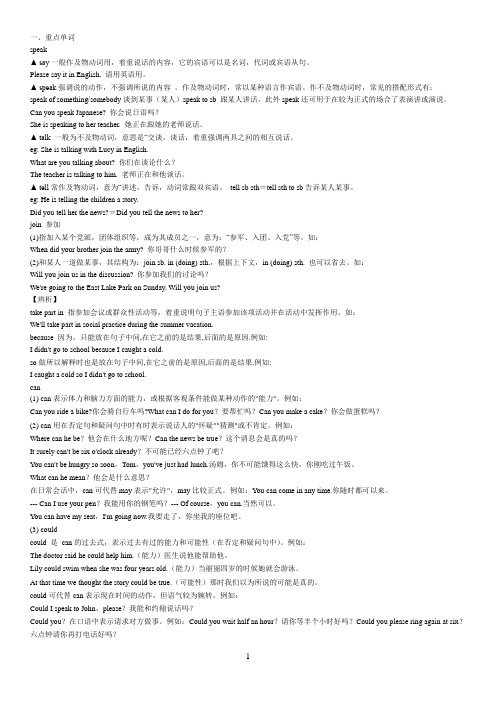
一、重点单词speak▲ say一般作及物动词用,着重说话的内容,它的宾语可以是名词,代词或宾语从句。
Please say it in English. 请用英语用。
▲ speak强调说的动作,不强调所说的内容。
作及物动词时,常以某种语言作宾语。
作不及物动词时,常见的搭配形式有:speak of something/somebody谈到某事(某人)speak to sb 跟某人讲话,此外speak还可用于在较为正式的场合了表演讲或演说。
Can you speak Japanese? 你会说日语吗?She is speaking to her teacher. 她正在跟她的老师说话。
▲ talk 一般为不及物动词,意思是“交谈,谈话,着重强调两具之间的相互说话。
eg: She is talking with Lucy in English.What are you talking about? 你们在谈论什么?The teacher is talking to him. 老师正在和他谈话。
▲ tell常作及物动词,意为“讲述,告诉,动词常跟双宾语。
tell sb sth=tell sth to sb告诉某人某事。
eg: He is telling the children a story.Did you tell her the news?=Did you tell the news to her?join 参加(1)指加入某个党派,团体组织等,成为其成员之一,意为:“参军、入团、入党”等。
如:When did your brother join the army? 你哥哥什么时候参军的?(2)和某人一道做某事,其结构为:join sb. in (doing) sth.,根据上下文,in (doing) sth. 也可以省去。
如:Will you join us in the discussion? 你参加我们的讨论吗?We're going to the East Lake Park on Sunday. Will you join us?【辨析】take part in 指参加会议或群众性活动等,着重说明句子主语参加该项活动并在活动中发挥作用。
七年级英语下Module 2 知识点归纳与复习外研版

外研七年级下Module 2 知识点归纳与复习单元知识清单重点单词1. f_ st _ v _ l 节目2. r _ _ dy 有准备的3. m _ _ l 一餐4. dr _ g _ n 龙5. sw _ _ p 打扫6. b _ d 坏的,不好7. d _ c _ r _ t _ 装饰8. _ v _ ry _ n _ 每个人,每一个9. d _ mpl _ ng 饺子10. sw _ _ t 甜的11. f _ _ ew _ _ ks 焰火12. f _ w 不多,很少13. r _ _ nd 圆的14. c _ l _ _ r 颜色15. cl _ _ n 打扫,弄干净必会短语1. get _____ for 为……准备好2. dragon _______ 舞龙3. sweep ______扫去4. _____ work 在工作5. paper ______剪纸6. New ______Eve 新年前夜7. a ______ 一些8. all the ______ ______ 一年到头9. the ______ ______ 春节10. ______ the floor 扫地应知语法和句式1. Is she sleeping? 的肯定回答:__________否定回答是:__________2. 询问你经常干什么:you ______ ?3. 询问你正在干什么:you _______?4. 询问某物的颜色,要说:What colour + be + 主语?5. 现在进行时的构成:(1)一般疑问句:Am/Is/Are + 主语+ v-ing?如:that boy writing? 那个孩子正在写吗?Am/Is/Are + 主语+ v-ing + 其他?如:that boy writing a letter?那个孩子正在写信吗?(2)特殊疑问句特殊疑问词+一般疑问句+?如:What you doing now? 你在干什么?your father doing? 你父亲在干什么?6.现在进行时与一般现在时的对比:(1)根据句中的时间状语判断。
外研版七年级英语下册Module2 总复习课件(共28张PPT)

句型大闯关
本单元重点句子有哪些?看谁说得多!
5. Choose me as your class monitor and I promise to help YOU! 选我当你们的班长,我保证会帮助你们! as的意思是“作为,当作” 例: As a student, she has to finish her homework. 作为一个学生,她必须完成作业。 promise “允诺;许诺” promise sb. to do sth. 答应某人做某事
13、He who seize the right moment, is the right man.谁把握机遇,谁就心想事成。2021/7/232021/7/232021/7/232021/7/237/23/2021
14、谁要是自己还没有发展培养和教育好,他就不能发展培养和教育别人。2021年7月23日星期五2021/7/232021/7/232021/7/23
句型大闯关
本单元重点句子有哪些?看谁说得多!
4. I get on well with everyone… 我和每个人都相处得很好…… get on well with... “与......相处融洽;进展顺利” 例: Do you get on well with your parents?你跟你父母相处得好吗? I get on very well with them. 我和他们相处的非常好。 如果想询问“与某人相处得怎样”,要用how来提问。 例: How do you get on well with your classmates? 你跟同学相处 得怎样?
fly a kite 放风筝
30. 游泳 v. _s_Байду номын сангаас_i_m_____
外研-七年级下册-学生版-Module2

Module 2 What can you do?【新手目标】通过本关,你能够谈论竞选班长的话题。
★★☆☆☆☆关卡1 Unit1 I can play the piano【过关笔记】Daming: Look ! The new clubs for this term are on the board. I’d like to join the Music Club because I can play the piano. What about you, BettyBetty:I like cooking, so I can join the Food and Drink Club. Can you cook, Daming Daming: No, I can’t. Well, I can cook eggs, but that’s all. What about Lingling Which club can she joinBetty:I think she’d like to join the Dancing Club because she can dance reallywell .Tony , how about youTony: I’d like to join the Chinese Club. I can’t speak Chinese very well.Daming: Don’t worry about Chinese. We can teach you Chinese! So choose your favourite club.Tony: OK then. .I play table tennis, so I choose the Table Tennis Club.That’s my favourite!【过关笔记】1.打乒乓球________________2. 与某人相处融洽_________________3. 弹钢琴_________________4. 做......怎么样?_________________5. 担心_________________6. 教某人_________________ ;_________________7. 教某人某事______________8. 愿意做某事_________________9. .打球_________________ 10.演奏......乐器_________________【成长例题】一.单项选择例题1.画线部分字母发音不同于其他三项的是___。
外研社新版七年级下册Module_2_知识点

自主梳理,厚积薄发。
一、重点词汇拓展1. 做饭_____2. 跳舞_____3. 俱乐部_____4. 弹钢琴_______5. 学期________6. 打乒乓球_____7. 布告板____8. 骑自行车____9. 教、讲授____ 10. 说汉语_____11. I’d like to be the class ________(班长) .12. He ______ _______ _______ _______ (相处融洽)everyone13. I ________(保证) to help you.14. He is really fit and _______ (健康).15. I’m sure ________(每个人) would like a clean classroom.2. Don’t worry! . I _______ _______ do just as you say(我保证照你说的做)3. I can _______ _______ _______ _______ my classmates.4. He paints very well, that means he _______ _______ _______painting.5. Lingling _______ _______ _______ us, so we all like her.6. _______ you _______ _______ start?(你准备好开始了吗)三、句型转换1. I’d like to paly football.(对画线部分提问What _______ you_______ _______ do?2. Mike can play basketball well.(改为一般疑问句)________ Mike _______ basketball well?3. Today is Sunday.(对画线部分提问)________ _______ _______ _______ today?4. The often watch fireworks at midnight.(用now替换often)They ____ ____ fireworks now.5. The sweater is 30 dollars. (画线部分提问)________ ________ is the sweater?6.I’d like to be the class monitor..(对画线部分提问)________ ________ you ________ to be?7. They usually have_breakfast at 8∶00.(对画线部分提问)___ __ they usually _ at 8∶00?8. His mother is cooking_the_meal?(对画线部分提问)__ ______ his mother ______?9. Can Tony dance well?(作否定回答)________,________ ________.10. Mike leanrs Math very well.(写出同义句)Mike ________ ________ ________Math.重点难点,一网打尽四、用所给动词的正确形式填空1. I’d like ________(join) the Art Club.2. My sister likes ________(read).3. Betty can ________(ride) a bike.4. He wants ________(go) to school on foot.5. Mr.Black ______(teach) us English.6. We should get on ________(good) with our classmates at school.7. It's 2 pm. Everyone in our class ________(listen) to the teacher carefully.8. ____(paint) the door red,please.9. My parents don't want me ____(go) to bed late.10. Yuanxiao brings ________(we) good luck all the year round.五、单项选择1. I’d like ________the class monitor.A. toB.to beC. isD. am2. Tom can play______,but he can’t play_____A. the soccer,pianoB. the soccer,the pianoC. soccer,pianoD. soccer,the piano3. —What' can you do?—I can __Chinese Kung Fu.A. makeB. palyC. doD. have4. I often help my mother ______ cleaning.A. doesB. doingC. forD. do5. —Are they good at____? —Yes, they are.A. swimB. to swimC. swimmingD. the swim6. Look! They ________ dinner.A. is havingB. are haveC. havingD. are having7. You can call me ___at 662-9057 when you need helpA. atB. onC. inD. to8. Tony gives___some books,we like ___A. we,itB. us,theyC. us,themD. me,them9. What ______ interesting book it is!A. aB.theC. anD. ∕10. -__you come to my birthday party tomorrow,Robert? -I’m afraid not.I haveto study.A. MustB. ShouldC.CanD. Need举一反三,一显身手六、阅读理解On New Year's Eve(前夕),people in Italy throw out all the old things. So there are chairs,beds,clothes and plates in the streets. In Spain,the new year comes more quietly. In the evening people come together to the streets. Each holds a bag of grapes(葡萄). When twelve o'clock comes,people start eating the grapes.In Japan,people eat noodles(面条) on New Year's Eve. This food is said tobring long life. Early the next morning,some families climb Mount Fuji(富士山). There they watch the first sunrise of the new year.1. This story is about New Year's Eve in ____.A. ItalyB. SpainC. JapanD. all of the above2. People in Spain welcome New Year by ______ after twelve.A. eating grapesB. eating noodlesC. throwing the old thingsD. watching the sunrise3. People in both Spain and Japan ________ to welcome the New Year.A. throw things awayB. get togetherC. eat some foodD. climb a mountain4. Japanese climb Mount Fuji to ________.A. look at the starsB. look for New Year's wishesC. see the sun coming upD. have a rest5. The people in ________ wish to get long life from their New Year's food.A. JapanB. ChinaC. SpainD. ItalyHi! Let me tell you something about my beautiful house. I live in a nice and new apartment building. The building has eighteen floors. There are about eighty families in the building. That is to say, about two hundred and forty people live in the building.My home is on the twelfth floor. We have two bedrooms and a sitting room. They are big and clean. There are a lot of big trees and beautiful flowers around our building. I like looking out of the window in my room. I can see cars and buses running in the street. I can see people walking in the street, too. They look so small! I can also see a lot of tall buildings. I am happy to live in this beautiful community.根据短文内容,选择最佳答案。
外研版英语七年级下单元Module 2 知识点+单元卷+思维导图

Module2 What can you do?单词:play, ride, teach, start, promise, then, ready, just, sure, tidy短语:What/how about..?worry aboutlike doing sth.play table tennisjoin...clubget on well with...do well atbe ready to helppromise to do sth.do cleaning at home句型:I’d like to join the Music Club because I can play the piano.I get on well with everyone...Choose me as your class monitor and I promise to help YOU!I often help my mother do cleaning at home...语法:情态动词cancan+动词原形,某人能做某事can't/can not+动词原形,某人不能做某事I can play table tennis.David can't speak Chinese.Can she swim?Yes, she can./No, she can't.Module2 What can you do单元卷(时间:90分钟分值:100分)一、单项选择(每小题1分;共10分)1.—Can you play _______ piano?—No, I can’t. But I can play _______ basketball.A. the, theB. the, aC. the, /D. a, the2. It’s surprising that Mr. Ma’s little daughter _____ speak English so well.A. mustB. canC. mustn’tD. can’t3. I’d like ______ the zoo with you this afternoon.A. goB. to goC. to go toD. go to4. ______ your book on the desk, please.A. PutB. PuttingC. To putD. To putting5. The boy is five years old, but he can ______ a bike.A. rideB. ridesC. ridingD. to ride6. He is a strange man. He gets on ______ with his workmates.A. goodB. badC. wellD. badly7. I tell my mother not ______me.A. worry aboutB. to worryC. to worry aboutD. worry8. Our teacher promises ______ a class meeting this week.A. to haveB. haveC. hasD. having9. Miss Read is good ______ music. She is good ______ children in the music club.A. at; atB. with; withC. at; withD. with; at10. —Do you like English or maths?—______.A. Yes, I doB. No, I don’tC. I like EnglishD. Yes, I like math二、完形填空(每小题2分;共20分)Jason, a 16-year-old boy, is the PE monitor in our class. He is from Africa. He often 11 basketball with other boys after school. When we can’t 12 him, he must be in the playground. He is the 13 basketball player and runner (跑步的人) 14 our school team. That’s 15 he becomes the PE monitor.Jason is strong and his hands are 16 . He can hold a basketball with one hand. He is 17 and often helps other students. He 18 on with everybody and we 19 like him. There is a basketball 20 tomorrow. Let’s go and cheer (为……喝彩) Jason!11. A. gives B. watches C. helps D. plays12. A. leave B. live C. find D. check13. A. best B. most C. bad D. large14. A. at B. in C. with D. by15. A. when B. how C. why D. where16. A. careful B. nice C. fast D. big17. A. beautiful B. kind C. strange D. special18. A. makes B. does C. gets D. takes19. A. really B. still C. never D. even20. A. movie B. story C. programme D. match三、阅读理解(每小题2分;共30分)APeople in India call New Year “Diwali” or “the Festival of Light(光)”.They often clean their houses before the day of Diwali.Most people clean their houses in the morning.They often decorate their houses with flowers.They also make sweet food which looks like(看起来像)flowers,people and animals.Then they visit their friends and give them presents and cards.On New Year's Day,many people open the doors and windows and light(点亮)candles in front of the doors.They want to bring good luck to their families.After Diwali,people often clean their houses again.Some people like to make loud noises(噪音)at their houses.They think this canmake bad spirits(精灵)away.21.People in India call New Year “the Festival of ______”.A.Food B.Fruit C.Light D.Luck22.Indian people often decorate their houses with ______.A.trees B.grass C.flowers D.cards23.Indian people make ______ which looks like animals.A.presents B.sweet food C.clothes D.pap er cuts 24.The underlined word “candles” means ______ in Chinese.A.蜡烛B.火把C.灯D.灯笼25.Which of the following is NOT true?A.People in India often light candles on New Year's Day.B.People in India often clean their houses before and after Diwali.C.On New Year's Day,Indian people often visit their friends.D.Some Indian people make loud noises,because they want to make bad spirits away.BThanksgiving Day is a public holiday. It is on the fourth Thursday in November in the USA and on the second Monday in October in Canada.For many Americans it is the most important holiday apart from(除……之外)Christmas.Schools,offices and most businesses close for Thanksgiving Day,and man y people make the whole weekend a vacation.Today people celebrate Thanksgiving Day to remember the early days.The most important part of the celebration is a traditional dinner with foods that come from North America.The meal includes(包括)turkey,sweet potatoes and so on.On Thanksgiving Day, there are special television programmes and sports events. Thanksgiving Day is considered(认为)as the beginning of Christmas period, and the next day many people go out to shop for Christmas presents.26.When is Thanksgiving Day in Canada?A.The fourth Thursday in November. B.The second Monday in October.C.The fourth Monday in October.D.The second Thursday in October. 27.Is Thanksgiving Day a public holiday?A.Yes, it is. B.No, it isn't.C.We don't know. D.None is right.28.Does the USA have Thanksgiving Day?A.Yes, it does. B.No, it doesn't.C.We don't know. D.None is right.29.______ is the beginning of Christmas period.A.Thanksgiving Day B.Father's DayC.Mother's Day D.Christmas30.______ is the most important part on Thanksgiving Day.A.Turkey B.Sweet potatoesC.Shopping D.A traditional dinner31. You can see your favorite movie star _______ .A. in Chengdu People’s SquareB. in the clubC. in Sichuan History MuseumD. at the cinema32. We can’t learn _______ in the club.A. musicB. artC. EnglishD. dance33. If you want to have music and art lesson, you will pay _______ .A. ¥90B. ¥150C. ¥180D. ¥13034. People can visit the museum at _______ every day.A. 1:00 pmB. 3:00 pmC. 7:00 pmD. 8:00 am35. _______ can get into the museum for free.A. An adultB. A studentC. A teacherD. A child under 6 years old四、任务型阅读(每小题2分;共10分)It’s September 1st, and we’re all back to school. It’s good to see all my teachers and friends again. They all look fine.We’re in Grade Two this year. We have some new subjects. I’m not good at Chinese, but Li Lin says she’s going to help me. I think I can do better.I like English very much. Zhang Li likes English, too. But she needs (需要) help. I think I can help her.Mr Gao is our English teacher. He doesn’t know all of us. So he has our names on a piece of paper and calls our names before he begins his lessons.根据短文内容,回答下列问题。
外研社英语七年级下2模知识点总结

七下2模知识点任课教师:孟萍be ready …是准备好的be/get ready for sth./doing sth. 为…准备好be/get ready to do sth. 准备做…(adj.)干净的(v.) 打扫,弄干净 clean sth. clean sth up cleaner(n.) 清洁员(n.) 厨师(v.) 做饭,烹饪 cook a meal for sb.=cook sb. a meal 为某人做一顿饭cooker (n.) 厨具4.辨析“学习”study 强调学习的过程,研究学习learn 强调学习的结果,学,学会 learn sth.学习某事 learn to do sth. 学习做某事 learn a dragon dance 学习舞龙a lantern / make lanterns 做灯笼the floor 扫地 sweep away 扫掉 sweep away bad luck 扫掉霉运地板 on the floor在地板上楼层在几楼要用序数词表示 on the +序数词 floor on the first floor在一楼发生,指偶然发生,无法预料,事作主语 happening(现在分词)1) sth+happen+地点/时间某事发生上某地或某时The story happened in 1990. An accident happened in the street.2) sth+happen to sb 某事发生在某人身上,要用介词toAn accident happened to Mary last night. 玛丽昨晚出车祸了。
(n.) 帮助 Thank you for your help.(v.) 帮助 help sb (to) do sth.帮助某人做某事 Tom helps me (to) study English. help sb. with sth. 在某方面帮助某人 Tom helps me with my English. helper(n.) 助手 helpful(adj.) 乐于助人的,有帮助的10. be at work=be working 在工作(n.) 传统,可数名词 traditional(adj.)传统的bad for sth./doing sth. 对…有害处 badly(adv.)坏地,非常(n.) good luck 好运,祝你好运 bad luck霉运,倒霉lucky(adj.)幸运的---反义词unlucky不幸运的luckily(adv.)幸运地----反义词 unluckily 不幸运地14. paint(v.) 粉刷,涂 paint sth.+颜色把…涂成什么颜色painter(n.) 画家,粉刷匠 painting(n.) 画,油画(v.) mean sth.意味着…mean that +宾语从句意味着…mean to do sth. 愿意做… He means to help me.meaning(n.) 意思 The meaning of the word is big.这个词的意思是大的。
七年级英语下册Module2Whatcanyoudo重点清单新版外研版
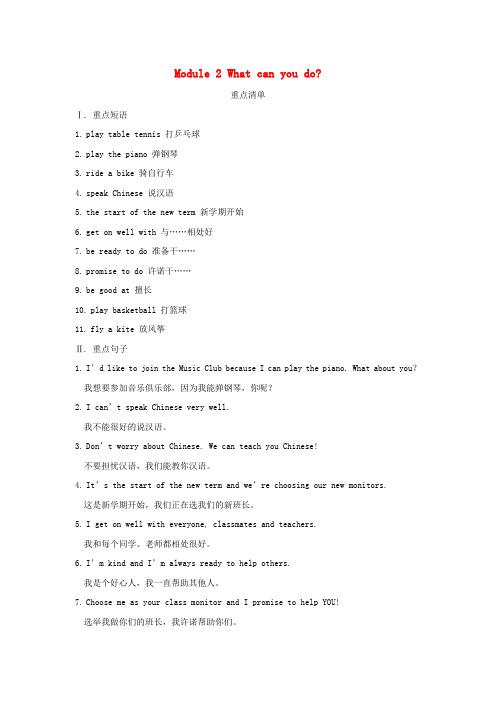
Module 2 What can you do?重点清单Ⅰ. 重点短语1.play table tennis 打乒乓球2.play the piano 弹钢琴3.ride a bike 骑自行车4.speak Chinese 说汉语5.the start of the new term 新学期开始6.get on well with 与……相处好7.be ready to do 准备干……8.promise to do 许诺干……9.be good at 擅长10.play basketball 打篮球11.fly a kite 放风筝Ⅱ. 重点句子1.I’d like to join the Music Club because I can play the piano. What about you?我想要参加音乐俱乐部,因为我能弹钢琴,你呢?2.I can’t speak Chinese very well.我不能很好的说汉语。
3.Don’t worry about Chinese. We can teach you Chinese!不要担忧汉语,我们能教你汉语。
4.It’s the start of the new term and we’re choosing our new monitors.这是新学期开始,我们正在选我们的新班长。
5.I get on well with everyone, classmates and teachers.我和每个同学、老师都相处很好。
6.I’m kind and I’m always ready to help others.我是个好心人,我一直帮助其他人。
7.Choose me as your class monitor and I promise to help YOU!选举我做你们的班长,我许诺帮助你们。
8.I’m really good at football, and I play basketball in the school team!我擅长足球,并且我在校队打篮球。
- 1、下载文档前请自行甄别文档内容的完整性,平台不提供额外的编辑、内容补充、找答案等附加服务。
- 2、"仅部分预览"的文档,不可在线预览部分如存在完整性等问题,可反馈申请退款(可完整预览的文档不适用该条件!)。
- 3、如文档侵犯您的权益,请联系客服反馈,我们会尽快为您处理(人工客服工作时间:9:00-18:30)。
Module2
——by 杨月华
Word
play演奏,弹奏 ride (rode)骑 teach(taught)教,讲授 worry焦虑,担心
all所有的 term学期 club俱乐部 then那么,就 start开始,开端 best最好的just只是,仅仅 fit健康的,强健的 fast快速的,快的 team队,队伍
tidy整洁(齐)的,收拾,整理 everybody每个人 beautiful美丽的,美的monitor班长,委员 fly飞,乘飞机 swim(swam)游泳
Phrase
play table tennis打乒乓球 play the piano弹钢琴 speak Chinese说汉语
ride a bike 骑自行车 Don’t worry.别担心。
worry about…担心……
join the Dance Club加入舞蹈俱乐部 That’s all.仅此而已。
just like正如,正像
would like想要,希望 do well做得好 fly a kite放风筝 the cleaning monitor清洁委员 swim well游泳游得好 get the score得分 do some cleaning做清洁打扫卫生
sentence
get on well with sb与某人相处融洽
e.g. He gets on well with everybody. 他与每个人都相处融洽。
promise to do sth 承诺做某事
e.g. I promise to help you. 我承诺帮助你。
help sb do sth帮助某人做某事
e.g. I often help my mother do cleaning at home.我经常在家帮妈妈打扫卫生。
would like to do sth 想要做某事 = want to do sth
I would like to join the Chinese Club.=I want to join the Chinese Club.
我想加入汉语俱乐部。
enjoy doing sth 喜欢做某事,享受做某事
e.g. I enjoy cooking. 我喜欢做饭。
e.g. She enjoys dancing. 她喜欢跳舞。
Be good at sth.擅长某事
I am good at math. 我很擅长数学。
Be good at doing sth.擅长做某事
He is good at playing football.他很擅长踢足球。
Be ready to do sth.乐于做某事。
He is ready to help others. 他乐于帮助别人。
语法情态动词can 的用法Can的意思:能,会,可以,
句型 sb can do sth 某人会做某事can后用动词原形do e.g. I can swim.我会游泳。
e.g. He can run fast.他可以跑得很快。
否定句:在can后加not, 通常情况下把cannot所写成can’t 句型sb can’t do sth
e.g. I can’t swim.我不会游泳。
e.g. He can’t run fast. 他不能跑很快。
一般疑问句:把can 提前,句中有I,We 的要改为you。
句型:Can sb do sth
e.g. Can you swim?你会游泳吗?
肯定回答: Yes, I can. 是的,我会。
否定回答:No,I can’t. 不,我不会。
e.g. Can he run fast?他能跑得快吗?肯定回答: Yes, he can.是的,他能。
否定回答:No,he can’t. 不,他不能。
情态动词may的用法和can一样。
